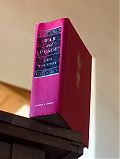
Leo Tolstoy
War and Peace, The End
Finishing War and Peace was initially a thought which left me heartbroken. Over months of reading a relationship is formed, not only with characters but with book as lugubrious object; its size and weight is what one must shoulder to read a book that rises, by girth or might, above most other books. Initially. For when I did close the final page, relief swept me.
Epilogue, Part Two, is grueling at page 1200. Since it’s Tolstoy I allow that there are points to be made, good points and thought provoking points, once one passes the incessant breakdown of historians’ categories. Free will, the ratio of freedom to necessity, the cone of hierarchy are gold embedded in concrete. And what stamina for the writer to end it on such rationality, almost betraying fiction.
Tolstoy wrote apropos:
I would like readers not to see or seek in my book what I did not want or was not able to express, and to pay attention to precisely what I wanted to express, but on which I did not consider it appropriate to dwell.
Pierre seems to express what Tolstoy wanted most to express. His captivity by the French during the occupation of Moscow, his witness of executions and the belief of his own impending execution, his forced march out of Moscow finished the transformation begun during the Battle of Borodino. All previous attempts to procreate some meaning, such as Masonry, did nothing when compared to direct suffering.
The prison as a place where one meets the limits of suffering reminds me of Resurrection, as if extending this relatively small portion of a rather large book. It is not a small idea. What Pierre thought freedom to be, everything he could have by his riches and benign activity, was also staked with limits. Decisions he thought were made by his own will were now perceived as no freer than being locked in a stable for the night.
He had learned there was a limit to suffering and a limit to freedom, and that those limits are very close.
When man hits a point where he cannot suffer more, human vitality kicks in and the saving power of the shifting attention. Though I wonder, is a limit of suffering death? Prince Andrei hangs on death’s edge for weeks. His reunion with Natasha brings him back to the possibility of life, and he suffers. Prince Andrei’s renewed hope for life fuels Natasha’s hope for an implausible recovery. But when he finally “awakens from life” like one awakens from a dream, then death becomes her burden.
Out of which comes the friendship between Princess Marya and Natasha, a thousand pages back impossible. Marya seems to be the only one who does not change, keeping her luminous gaze steady as if waiting for everyone to come join her in their awakening. Natasha is no longer a cheerful young girl, but a witness to death like everyone, so much so that Pierre, her admirer, does not at first recognize her.
The French movement into Russia and then back out again leaves little unscathed on the road to Moscow and in Moscow itself. The city burns and looters flee with riches only to abandon them during the hard retreat. The retreat of the French would have been comical if so many hadn’t died of hunger and sickness and the Russian winter. Napoleon just up and leaves. All that war for what?
The answer lies in the toilsome second part of the epilogue, in history, in the multiple causes that bring about an event. But there is never a justification. The impact on human lives cannot be quantified. I find it is better understood through a photograph or through a story. The Rostovs, when War and Peace began were a lively and invigorated bunch. At the end they are only half of what they used to be, in number and in spirit.
Though most of the book is mainly set in the top strata of society, it provides a timeless and human picture. Before reading Anna Karenina, the name Tolstoy had a dull ring to me on account of this giant classic. How ridiculous! There is so much in this great book that I look forward to reading again, in thirty years!
See also War and Peace, Volume: One, Two, Three
In captivity, Pierre had learned, not with his mind, but with his whole being, his life, that man is created for happiness, that happiness is within him, in the satisfying of natural human needs, and that all unhappiness comes not from lack, but from superfluity.
· · · · · · · · · · · · · · · · · · · ·